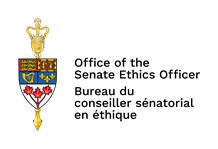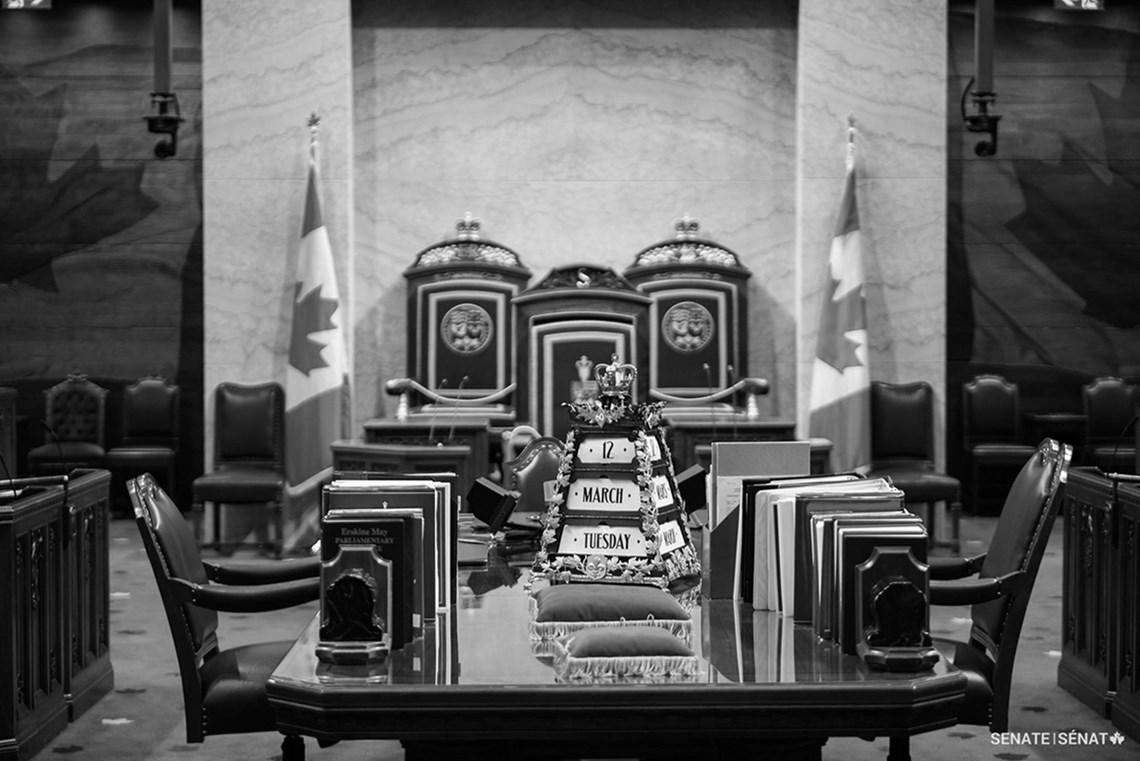Duty to Disclose
Confidential disclosure statement: sitting Senators
27. (1) Every Senator shall file, in each calendar year and within 30 days of the anniversary of their summons to the Senate, a confidential statement disclosing the information required by section 28.
Confidential disclosure statement: new Senators
27. (2) Within 60 days after being summoned to the Senate, a Senator shall file a confidential statement disclosing the information required by section 28.
Submission to Committee
27. (3) The Senate Ethics Officer shall submit to the Committee the name of any Senator who has not complied with his or her duty to file a confidential disclosure statement within the period specified under subsections (1) or (2).
Errors or omissions
27. (4) If the Senate Ethics Officer has reason to believe that a Senator’s confidential disclosure statement contains an error or omission, the Senate Ethics Officer shall notify the Senator concerned and request that the Senator provide the relevant information.
Response within 30 days
27. (5) Upon receipt of a request under subsection (4), the Senator shall provide the information within 30 days.
Family members
27. (6) In addition to any information required to be disclosed under subsection 28(1), a Senator may file with the Senate Ethics Officer a confidential disclosure statement relating to one or more of the Senator’s family members so that the Senator may discuss their interests in relation to the Senator’s obligations under this Code and receive advice in that regard.
Confidentiality
27. (7) The Senate Ethics Officer and all officers, employees, agents, advisers and consultants that may be employed or engaged by the Senate Ethics Officer shall keep all disclosure statements confidential.
Initial meeting with Senate Ethics Officer
27. (8) Senators, and in particular newly summoned Senators, who may have questions regarding their confidential disclosure duties should make every effort to meet with the Senate Ethics Officer before submitting their confidential disclosure statement.
Extension
27. 1 The Senate Ethics Officer may extend any time period in which an action is to be completed by a Senator under this Code if, in the opinion of the Senate Ethics Officer, circumstances exist that warrant the extension.
Contents of confidential dislcosure statements
28. (1) Subject to subsection (4), regarding excluded matters, and any guidelines published by the Senate Ethics Officer under section 43, the confidential disclosure statement shall list:
(a) any employment, profession or business in which the Senator or the Senator’s spouse or common-law partner participates, including a description of the activities of the Senator, spouse or common-law partner;
(b) any corporations, income trusts and trade unions in which the Senator or the Senator’s spouse or common-law partner is a director or officer, and any partnerships in which the Senator or the Senator’s spouse or common-law partner is a partner, including a description of the activities of each entity;
(c) any associations and not-for-profit organizations in which the Senator or the Senator’s spouse or common-law partner is a director, officer, or patron, including memberships on advisory boards and any honorary positions;
(d) the nature but not the amount of any source of income over $2,000 that the Senator or the Senator’s spouse or common-law partner has received in the preceding 12 months and is likely to receive during the next 12 months; for this purpose,
(i) a source of income from employment is the employer,
(ii) a source of income from a contract is a party with whom the contract is made,
(iii) a source of income arising from a business or profession is that business or profession, and
(iv) a source of income arising from an investment is that investment;
(e) the source, nature and value of any contracts or other business arrangements with the Government of Canada or a federal agency or body that the Senator has directly, or through a subcontract;
(f) the source, nature and value of any contracts, subcontracts or other business arrangements with the Government of Canada or a federal agency or body that the Senator has by virtue of a partnership or a significant interest in a private corporation that the Senator is able to ascertain by making reasonable inquiries;
(g) the source, nature and value of any contracts or other business arrangements with the Government of Canada or a federal agency or body that a member of the Senator’s family has, directly or through a subcontract, or by virtue of a partnership or a significant interest in a private corporation;
(h) information regarding the nature but not the value of any assets and liabilities of the Senator or the Senator’s spouse or common-law partner over $10,000;
(i) any trust from which the Senator could, currently or in the future, either directly or indirectly, derive an income or other benefit; and
(j) any additional information that the Senator believes to be relevant to this Code.
Limitation
28. (2) For the purposes of subsection (1), a Senator is only required to disclose such information concerning the affairs of a spouse or common-law partner or other family member as the Senator is able to ascertain by making reasonable inquiries or of which the Senator has knowledge.
Standard of disclosure
28. (3) Where a Senator is required under this section or subsection 31(1) to disclose such information as the Senator is able to ascertain by making reasonable inquiries, the Senator’s disclosure shall be to the best of the Senator’s knowledge, information and belief.
Excluded matters
28. (4) For the purpose of subsection (1), a Senator is not required to disclose properties used by the Senator or family members as residences; mortgages or hypothecs on such residences; household goods; personal effects; cash on hand or on deposit with a financial institution; guaranteed investment certificates; financial instruments issued by any Canadian government or agency; a benefit paid under the Old Age Security Act, the Canada Pension Plan, or An Act respecting the Quebec Pension Plan, CQLR, c. R-9; and obligations incurred for living expenses that will be discharged in the ordinary course of the Senator’s affairs.
Additional excluded matters
28. (5) The Senate Ethics Officer may, with the approval of the Committee, establish additional matters not required to be disclosed on the basis that they present no potential to interfere with the obligations of a Senator under this Code.
Material change
28. (6) A Senator shall report in writing any material change to the information relating to the confidential disclosure statement to the Senate Ethics Officer within 30 days after the change.
Meeting with Senate Ethics Officer
29. (1) After reviewing a Senator’s confidential disclosure statement, the Senate Ethics Officer may request to meet with the Senator to discuss the statement and the Senator’s obligations under this Code.
Necessary meeting
29. (2) If, pursuant to a request made under subsection (1), the Senate Ethics Officer advises the Senator that the meeting is necessary in order for the Senate Ethics Officer to carry out his or her duties and functions under the Code, the Senator shall meet with the Senate Ethics Officer.
Public Disclosure Summary
30. (1) The Senate Ethics Officer shall prepare a public disclosure summary based on each Senator’s confidential disclosure statement and submit it to the Senator for review.
Review
30. (2) The Senator shall, within 30 days of receipt of the public disclosure summary, review and return it to the Senate Ethics Officer with either his or her signed approval or proposed changes.
Contents of public disclosure summary
31. (1) The public disclosure summary shall list
(a) any employment, profession and business in which the Senator participates, including a description of the activities of the Senator;
(b) any corporations, income trusts and trade unions in which the Senator is a director or officer and any partnerships in which the Senator is a partner, including a description of the activities of each entity;
(c) any associations and not-for-profit organizations in which the Senator is a director, officer or patron, including memberships on advisory boards and any honorary positions;
(d) the source and nature but not the amount of any income over $2,000 that the Senator has received in the preceding 12 months and is likely to receive in the next 12 months;
(e) the source and nature but not the value of any contracts or other business arrangements with the Government of Canada or a federal agency or body that the Senator has, directly or through a subcontract, including the Senate Ethics Officer’s written opinion authorizing them;
(f) the source and nature but not the value of any contracts, subcontracts or other business arrangements with the Government of Canada or a federal agency or body that the Senator has by virtue of a partnership or a significant interest in a private corporation that the Senator is able to ascertain by making reasonable inquiries, including the Senate Ethics Officer’s written opinion authorizing them;
(g) the source and nature but not the value of any contracts or other business arrangements with the Government of Canada or a federal agency or body that a member of the Senator’s family has, directly or through a subcontract, or by virtue of a partnership or a significant interest in a private corporation, that the Senator is able to ascertain by making reasonable inquiries;
(h) information regarding the nature but not the value of any assets and liabilities of the Senator over $10,000;
(i) any trust from which the Senator could, currently or in the future, either directly or indirectly, derive an income or other benefit;
(j) any declarations of a private interest under section 12, unless the Senator has since retracted the declaration;
(k) any statements filed under sections 17 and 18 in relation to gifts and sponsored travel; and
(l) any statements of material change that pertain to the contents of this summary.
Discretion
31. (2) The Senate Ethics Officer need not include in the public disclosure summary information that he or she determines should not be disclosed because
(a) the information is not relevant to the purposes of this Code or is inconsequential, or
(b) a departure from the general principle of public disclosure is justified in the circumstances
Disagreement
32. In cases of disagreement between a Senator and the Senate Ethics Officer regarding the contents of the public disclosure summary, the Senate Ethics Officer shall refer the disputed matter to the Committee for decision.
Public inspection
33. (1) Each public disclosure summary is to be placed on file at the office of the Senate Ethics Officer and made available for public inspection.
Removal of file from registry
33. (2) A public disclosure file shall be removed from the public registry at the time that the Senator concerned ceases to be a Senator.
Online access
33. (3) Every public disclosure summary available for public inspection under this section shall also be made available online on the website of the Senate Ethics Officer.
Evasion
34. A Senator shall not take any action that has as its purpose the evasion of the Senator’s obligations under this Code.

